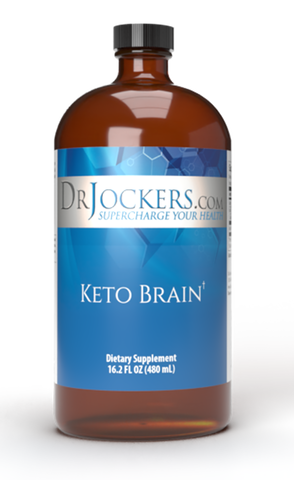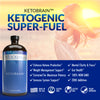
I use MCT oil as a fat source to boost ketone production and stabilize blood sugar! MCTs are immediately metabolized into ketone bodies to be used for quick energy in the body.- Dr. Jockers
Let's discuss the key benefits of KetoBrain C8 MCT Oil:
Why choose KetoBrain?
Why are MCT oils important?

Why does Dr. Jockers recommend our MCT oil?

"I've been on keto and now carnivore but for whatever reason not able to get into / stay in ketosis. This C8 mct oil changed that! Plus it gives me energy!" -Leslie
Read our customer reviews and you'll see why our clients agree these are...
Supplements You Can
TRUST
KetoBrain C8 MCT Oil

Why choose KetoBrain?
KetoBrain C8 MCT Oil is extracted from natural sources using a three-stage steam-based filtering process without the addition of any chemicals. The result is a pure and ketogenic C8 (caprylic acid triglyceride) formulation.

How are MCTs Metabolized?
MCTs are easily digested and do not require the production and utilization of bile (1). Most fatty acids depend upon bile salt emulsification to be metabolized and absorbed. The production of bile is an energy-dependent process that takes place in the liver.
Individuals with sluggish livers and gallbladders struggle to produce adequate bile. Other individuals who struggle with malnutrition or malabsorption syndromes can easily absorb and utilize these MCTs.
MCTs have a remarkable ability to stabilize high blood glucose and enhance ketone body production. This process makes MCTs a powerful tool to support a healthy inflammatory response, metabolism, and cognitive function.
Why are C8 MCTs important?
Unlike long-chain fatty acids, medium-chain triglycerides (MCTs) are quickly converted into ketones and are less likely to be reserved as body fat. The result is improved mental performance and energy!
Although C12 (lauric acid) is considered a medium-chain triglyceride, it behaves in the body like a long-chain fatty acid. Some brands include up to 50% lauric acid in their MCT oil. Choosing an MCT oil with only caprylic acid will provide the greatest health benefits.

What are Ketones?
MCTs provide immediate energy because they can cross the double mitochondrial membrane very rapidly and do not require the presence of carnitine (2).
The body has two major energy sources, it burns glucose or ketone bodies. The majority of people burn glucose primarily because they are constantly supplying a steady form of sugar, starches, and proteins that can be turned into blood glucose. When one either fasts or goes on a low-carb, moderate protein, and high-fat diet, they switch their energy source to fat.
In particular, the fatty acids are broken down into ketone bodies. The three major forms of ketones produced in the body include Acetoacetate, Acetone, and Beta-HydroxyButyric acid. These are released into the blood from the liver when insulin levels are low and hepatic liver metabolism is increased (3).
Ketones are unique energy-producing molecules made from fatty acids. Our bodies can make them from stored fat or MCTs. Ketones feed all the cells of the body, but in particular, they are a preferred fuel for the brain.
Ketones activate specialized regulatory proteins in the brain called brain-derived neurotrophic growth factors (BDNF). BDNF works to repair, protect, and enhance the function of the brain cells and the neurological networks (4).
BDNF also stimulates the growth of new, healthy neurons that take the place of older, dying cells. The inability to regulate dead or dying brain cells is a risk factor for neurodegenerative problems(5).
How do I include MCT oil?
MCT oil is very versatile and also heat stable up to 320 o F. Use it as a salad dressing or a thickening agent for coffee and teas. Add it to smoothies to help curb hunger and keep you satisfied longer.
Try it in one of my favorite coffee and dessert recipes!
What is the recommended dosage?
Normal Dosage: 1 tsp – 2x daily with food or drink
Advanced Dosage: 2 tsp – 2x daily with food or drink
When introducing a new supplement, we recommend taking the lowest dose for 2-3 days. As tolerated, increase the dose until you have reached the recommended normal or advanced guidelines. Reduce to a tolerable dosage if adverse effects occur.
References:
- D C Harvey CJ, Schofield GM, Williden M, McQuillan JA. The Effect of Medium Chain Triglycerides on Time to Nutritional Ketosis and Symptoms of Keto-Induction in Healthy Adults: A Randomised Controlled Clinical Trial. J Nutr Metab. 2018; 2018:2630565. PMCID: 5987302
- Studzinski CM, et al. Induction of ketosis may improve mitochondrial function and decrease steady-state amyloid-beta precursor protein (APP) levels in the aged dog. Brain Res. 2008 Aug; 1226: 209-17. PMID:18582445
- Kanikarla-Marie P, Jain SK. Hyperketonemia and ketosis increase the risk of complications in type 1 diabetes. Free Radic Biol Med. 2016; 95: 268–277. PMID: 4867238
- Maalouf M, Rho JM, Mattson MP. The neuroprotective properties of calorie restriction, the ketogenic diet, and ketone bodies. Brain Res Rev. 2009; 59(2):293–315. PMCID: 2649682
- Howells DW, et al.Reduced BDNF mRNA expression in the Parkinson’s disease substantia nigra. Exp Neurol. 2000 Nov; 166(1): 127-35. PMID: 11031089
Select Your Options & Add to Cart
† These statements have not been evaluated by the Food and Drug Administration.
This product is not intended to diagnose, treat, cure or prevent any disease.








